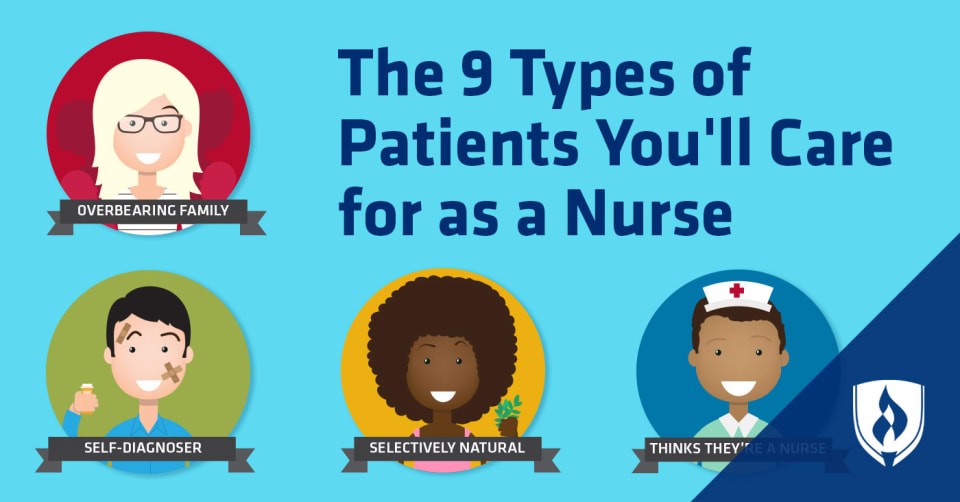
No two shifts are alike. But the longer you work on the nursing floor, the more you can’t help but notice patterns in the types of patients you treat. They make you laugh, make you cry, make you want to pull your hair out and, at times, remind you of exactly why you got into this line of work. No matter what, you can always count on them to liven up your shifts.
Where would you be without this colorful cast of characters to care for? Keep reading to see how many of these types of patients you—and just about any nurse—will have treated throughout your career.
Get Your Nursing School Questions Answered at a Nursing Information Session
9 types of patients you will encounter in your nursing career
Work long enough as a nurse and you’ll inevitably encounter these patients who fit the following profiles.
1. The self-diagnoser
You know this patient. This is the one who is convinced they've contracted a rare, African bird disease after entering a few common cold symptoms into an online symptom-checker. If a diagnosis was really that easy, then medical professionals would be out of the job. Thankfully nurses are there to field the questions and help correct the diagnoses when they go a little overboard.
“This patient is sure they have something rare, trendy and difficult to treat,” says Nick Angelis, CRNA, MSN and author. “They are often disappointed when they don't have multiple specialists asking them insightful questions they've already prepared answers for.”
2. The one with the overbearing family
Here’s another one you’re likely to see. You know the drill—walking into a patient’s room chock full of visiting family members. All eyes shift to you. In an instant they bombard you with a litany of questions. Or they try to speak for their fully capable family member in a misguided attempt at showing they care.
“These patients are typically sweet and laid back, unlike everyone related to them,” Angelis says. “Often, family members ignored them until they got really sick and are now trying to make up for it at your expense.”
Sometimes impassioned, sometimes dysfunctional, but never without a million questions—the overbearing families of your patients can always be counted on to keep your shifts interesting.
3. The one you get attached to
You’ve been told not to get attached to your patients, but the head and the heart don’t always agree. You’ll likely find yourself remembering special patients long after they’re gone. Whether it was their optimistic outlook, or the way you bonded before a big surgery, some patients occupy a special place in your heart.
“Almost every nurse I have ever known has developed attachments to certain patients,” says Teri Dreher, RN, CCRN, iRNPA. “Nurses who sincerely care for the welfare of their patients holistically will give more focused, intentional and attentive nursing care. Emotionally healthy nurses will be able to set boundaries, while at the same time, perform competent, loving care and nurture their patients.”
4. The skeptic
These incredulous patients are always looking for a second opinion. They may come into their appointment with medical knowledge after a little online research. However, this patient is hesitant to accept any of your explanations or advice, questioning your every move.
“Sometimes you can't blame them—if they've been from doctor to doctor only to be hurried through the system and placed on some drug that works on most people,” Angelis explain, “But if they were most people, they wouldn't be asking for a fourth opinion.”
5. The one that never goes to the doctor
You know this patient—the grumbling husband, dragged into his appointment by his concerned significant other. They’re rarely happy to see you and think their time would be better spent elsewhere: Running errands, finishing that project at home or a million other excuses. And they can’t remember the last time they had a checkup appointment.
“Between hospital-acquired infections, mistakes, drug allergies and side effects and treating the symptoms instead of dealing with the root cause, this patient has had enough,” Angelis says. He goes on to describe two other types of patients that fall into this category: the patient in denial who doesn't want to hear that they’re sick, and the patient in excellent health who wants to stay that way. Either way, they’re not happy to see you – but you don’t take it personally.
6. The pampered patient
“Their orange juice is more important than the other patients’ coding, and don't you forget it!” Angelis jokes. “Clear communication to avoid over-promising and unrealistic expectations is required to handle this patient.”
You know the type—this patient wants special treatment, grows irritated at unexpected wait times or strolls in late to their appointment. They want the five-star experience during their stay and might show their diva side when things aren’t up to their high standards—and some seem to not have the time of day for their appointment.
“Some patients won't put down their cell phones,” says nurse allergist Patricia Adamson, RN of Becker Ear, Nose & Throat Center. “That has proven to be very difficult to treat them.”
7. The one who thinks they’re the nurse
You’ll treat a few of these patients throughout your career, too. They may have grown up with a medical professional in the home. They may have spent one summer working at a veterinary clinic, or maybe their spouse is a nurse’s aide. No matter the case, they think they know enough to make sound medical decisions—despite how much your professional opinion differs.
“Their rudimentary knowledge is useless because they actually think they know enough to be consulted,” says Angelis. “They’ll say things like, ‘My neighbor died after taking a blood pressure medicine, so I'd better not.’”
8. The selectively ‘natural’ patient
Ever the curiosity, the selectively natural patient seems to opt for homeopathic remedies on a whim, but what they have in selectiveness they lack in consistency.
“These are the type who take Tylenol at the first glimmer of a headache but decide to try an all-natural labor,” Angelis says. “They might substitute homeopathics for vaccines, but have no trouble bleaching and dyeing their hair every month or pouring out pesticides to have a weed-free lawn.”
9. The one who reminds you why you do what you do
Even on your toughest days when nothing seems to go right, there will always be the patients who remind you of why you responded to the call of nursing and took up the rigor and reward of the field.
Whether it’s the humbling moments of your toughest patients fighting for their lives, the patients who are truly grateful for your care or simply knowing you made someone’s time in the hospital a brighter experience, these special patients come into your life again and again to remind you of why you first became a nurse.
Learn from fellow nurses
No matter how many types of patients you’ll care for in your years on the nursing floor, some aspects of a nursing career can’t be taught within a curriculum—they have to be experienced. A lesson plan can only take you so far when it comes to comforting a nervous patient or consoling a mourning, grieving family. These are things you learn to do primarily from experience and with a little wisdom from your fellow nurses.
Every patient has their own endearing qualities, quirks or challenges, but it’s your passion for helping that keeps you sporting your scrubs with a smile during every shift. But for those trying days, get a little advice from the pros in our article, “10 Terrific Tips for New Nurses Dealing with Difficult Patients.”
RELATED ARTICLES:
- What Makes a Good Nurse? Experts Reveal What It Takes
- RNs reveal 9 Natural Remedies for Reducing Nursing Stress
- The Best Day on the Job: 4 Nursing Stories that Prove It’s All Worth It
- Scoping out Healthcare Careers: Nursing vs. Medicine
- I Hate Bedside Nursing.. Now What?
- Types of Therapy: A Look at 7 Commonly Used Mental Health Treatments
- Does CNA Experience Help? What Future Nursing Students Should Know
- What Is Orthopedic Nursing: A Look Beyond the Bare Bones
- CVICU Nursing: A Specialty for Nurses with Heart




